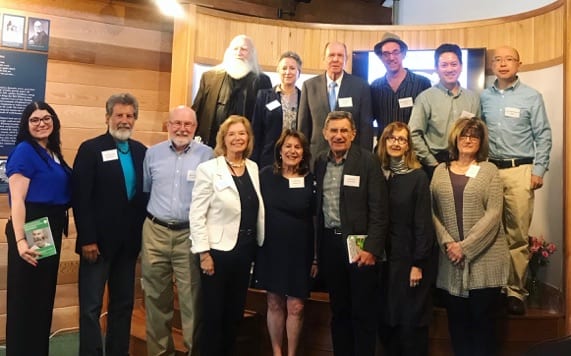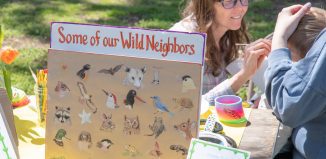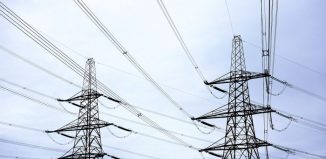Whitman legacy honored in Huntington

‘O Captain, My Captain’
By Walt Whitman
Whitman’s poem “O Captain, My Captain” is an elegy written to honor Abraham Lincoln in his work for the country in keeping it unified, said Cynthia Shor, executive director of Walt Whitman Birthplace Association.
Like all poems, the tribute contains a turning point that reveals an overarching meaning. See if you can find Whitman’s message in this poem, written in 1865, the year of Lincoln’s death.
O Captain! My Captain!
our fearful trip is done;
The ship has weather’d every rack,
the prize we sought is won;The port is near, the bells I hear,
the people all exulting,While follow eyes the steady keel,
the vessel grim and daring:But O heart! heart! heart!
O the bleeding drops of red,
Where on the deck my Captain lies,
Fallen cold and dead.
O Captain! My Captain!
rise up and hear the bells;
Rise up—for you the flag is flung—for you the bugle trills;
For you bouquets and ribbon’d wreaths—for you the shores a-crowding;
For you they call, the swaying mass, their eager faces turning;
Here captain! dear father!
This arm beneath your head;
It is some dream that on the deck,
You’ve fallen cold and dead.
My Captain does not answer,
his lips are pale and still;My father does not feel my arm,
he has no pulse nor will;The ship is anchor’d safe and sound,
its voyage closed and done;From fearful trip, the victor ship, comes in with object won;
Exult, O shores, and ring O bells!
But I with mournful tread,
Walk the deck my Captain lies,
Fallen cold and dead.
The Walt Whitman Birthplace Association hosted its first three-day international conference in honor of Whitman’s legacy. The event was held at Whitman Birthplace State Historic Site at 246 Old Walt Whitman Road in Huntington Station.
“All the presentations opened new roads into interpreting Whitman, whose words are still relevant today in his Bicentennial 200th birthday year,” Executive Director Cynthia Shor said. “Plans are being made for a follow-up conference in 2021.”
About 50 guests each day from both the local community and other parts of New York, such as Queens, attended to see 25 international presenters share their research about Whitman’s impact on cultural, social, historical, literary and gender issues from his lifetime to our lifetime.
Presenters traveled from six countries and 10 states to discuss topics such as translating Whitman’s poems into other languages, the use of his poems in contemporary advertising and the influence of mesmerism and Darwinism in his writing. Creative expressions were also included through poetry readings and open mic, films and music celebrating Whitman. There were nine panels in total, moderated by the association’s board members. Local Walt Whitman “personator” Darrel Blaine Ford dressed as Whitman and posed for pictures with attendees.
The keynote speaker was Professor Ed Folsom, the Roy J. Carver Professor of English at The University of Iowa. His panel discussion was titled “Whitman Growing Old” and he spoke about how Whitman confronted death in his poetry and how he still speaks to poets today, long after his death.
“There has been a gradual, almost imperceptible, shift in our view of Whitman and his work recently, as if we have been searching for the Whitman who can address and respond to a growing cultural despair instead of (or maybe in addition to) the Whitman who spurs on an endless optimism,” Folsom said. “Americans are, after all, at a far different period of the nation’s history than that which he experienced, a point where some of the democratic payoff that Whitman promised should be far more apparent than it is, a point where many of us begin to feel a need for a different Whitman, one more tempered in his outlook, older, pointing not the way to a fully achieved democratic future but rather one who can guide us about how to live in a diminished present on an earth of diminishing resources, in a society where the same old problems — of racial injustice, of grotesquely unfair wealth distribution, of continuing gender discrimination — just keep resurfacing, as virulent as ever.”
Folsom is the editor of the Walt Whitman Quarterly Review, co-director of the Whitman Archive and editor of the Whitman Series at The University of Iowa Press. He is the author or editor of numerous books and essays on Whitman and other American writers.
The association wishes hearty congratulations to all who took part and is delighted to have hosted an event shedding light on Whitman’s tremendous body of work and his charismatic personality.
This program was made possible with funds from Robert D.L. Gardiner Foundation, New York State Parks, Suffolk County, Town of Huntington, New York State Council on the Arts and Huntington Arts Council. The association offers special thanks and appreciation to these organizations for their continued support.
Whitman’s birthplace museum is open to the public seven days a week, 9 a.m. to 4 p.m. Monday through Friday and 9 a.m. to 5 p.m. Saturday and Sunday. After Labor Day, the site is open Wednesday to Friday, 1 to 4 p.m. and 11 a.m. to 4 p.m. on weekends. The site is located at 246 Old Walt Whitman Road in Huntington Station. For more information call 631-427-5240 or visit www.waltwhitman.org.






